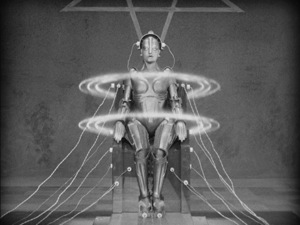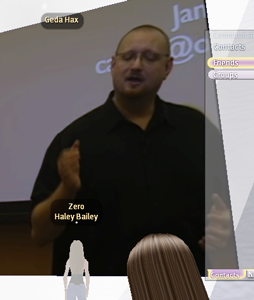High-Frequency Combat
 Science and technology luminaries Stephen Hawking, Elon Musk, and Steve Wozniak count among the hundreds of researchers pledging support of a proposed ban on the use of artificial intelligence technologies in warfare. In "Autonomous Weapons: an Open Letter from AI & Robotics Researchers", the researchers (along with thousands of citizens not directly involved with AI research) call on the global community to ban "offensive autonomous weapons beyond meaningful human control." They argue that the ability to deploy fully-autonomous weapons is imminent, and the potential dangers of a "military AI arms race" are enormous. Not just in the "blow everything up" sense -- we've been able to do that quite nicely for decades -- but in the "cause havoc" sense. They call out:
Science and technology luminaries Stephen Hawking, Elon Musk, and Steve Wozniak count among the hundreds of researchers pledging support of a proposed ban on the use of artificial intelligence technologies in warfare. In "Autonomous Weapons: an Open Letter from AI & Robotics Researchers", the researchers (along with thousands of citizens not directly involved with AI research) call on the global community to ban "offensive autonomous weapons beyond meaningful human control." They argue that the ability to deploy fully-autonomous weapons is imminent, and the potential dangers of a "military AI arms race" are enormous. Not just in the "blow everything up" sense -- we've been able to do that quite nicely for decades -- but in the "cause havoc" sense. They call out:
Unlike nuclear weapons, they require no costly or hard-to-obtain raw materials, so they will become ubiquitous and cheap for all significant military powers to mass-produce. It will only be a matter of time until they appear on the black market and in the hands of terrorists, dictators wishing to better control their populace, warlords wishing to perpetrate ethnic cleansing, etc. Autonomous weapons are ideal for tasks such as assassinations, destabilizing nations, subduing populations and selectively killing a particular ethnic group.
They don't specify in the open letter (which is surprisingly brief), but the likely rationale as to why autonomous weapons would be particularly useful for assassinations, population control, and genocide is that they wouldn't say "no." Despite the ease with which human beings can be goaded into perpetrating atrocities, there are lines past which some of us could never cross, no matter the provocation. During World War II, only 15-20 percent of U.S. soldiers in combat actually fired upon enemy troops, at least according to Brigadier General S.L.A. Marshal; while some debate his numbers, it's clear that a significant fraction of soldiers will say "no" even to lawful orders. Certainly a higher percentage of troops will refuse to carry out unlawful and inhumane orders.
Autonomous weapons wouldn't say no.
There's another problematic aspect, alluded to in the title of this piece: autonomous military systems will make decisions far faster than the human mind can follow, sometimes for reasons that will elude researchers studying the aftermath. The parallel here is to "high-frequency trading" systems, operating in the stock market at a speed and with a sophistication that human traders simply can't match. The problem here is manifold:
Although I signed the open letter, I do think that fully-autonomous weapon systems aren't quite as likely as some fear. I'm frankly more concerned about semi-autonomous weapon systems, technologies that give human operators the illusion of control while restricting options to pre-programmed limits. If your software is picking out bombing targets for you, that you tap the "bomb now" on-screen button may technically give you the final say, but ultimately the computer code is deciding what to attack. Or, conversely, computer systems that decide when to fire after you pull the trigger -- giving even untrained shooters uncanny accuracy -- distance the human action from the violent result.
With semi-autonomous weapons, the human bears responsibility for the outcome, but retains less and less agency to actually control it -- whether or not he or she recognizes this. That's a more subtle, but potentially more dangerous, problem. One that's already here.






 So,
So, 
 So, the official announcement for the
So, the official announcement for the 
 A few people have asked me what I thought of
A few people have asked me what I thought of  Just a few updates for those of you who like to hear these things:
Just a few updates for those of you who like to hear these things: A few bloggers -- and a couple of photographers -- took some notes on my talk at the Singularity Summit yesterday. Most simply recapped some of my lines (and one simply reprinted the whole talk), but I'll put the ones with commentary at the top:
A few bloggers -- and a couple of photographers -- took some notes on my talk at the Singularity Summit yesterday. Most simply recapped some of my lines (and one simply reprinted the whole talk), but I'll put the ones with commentary at the top: